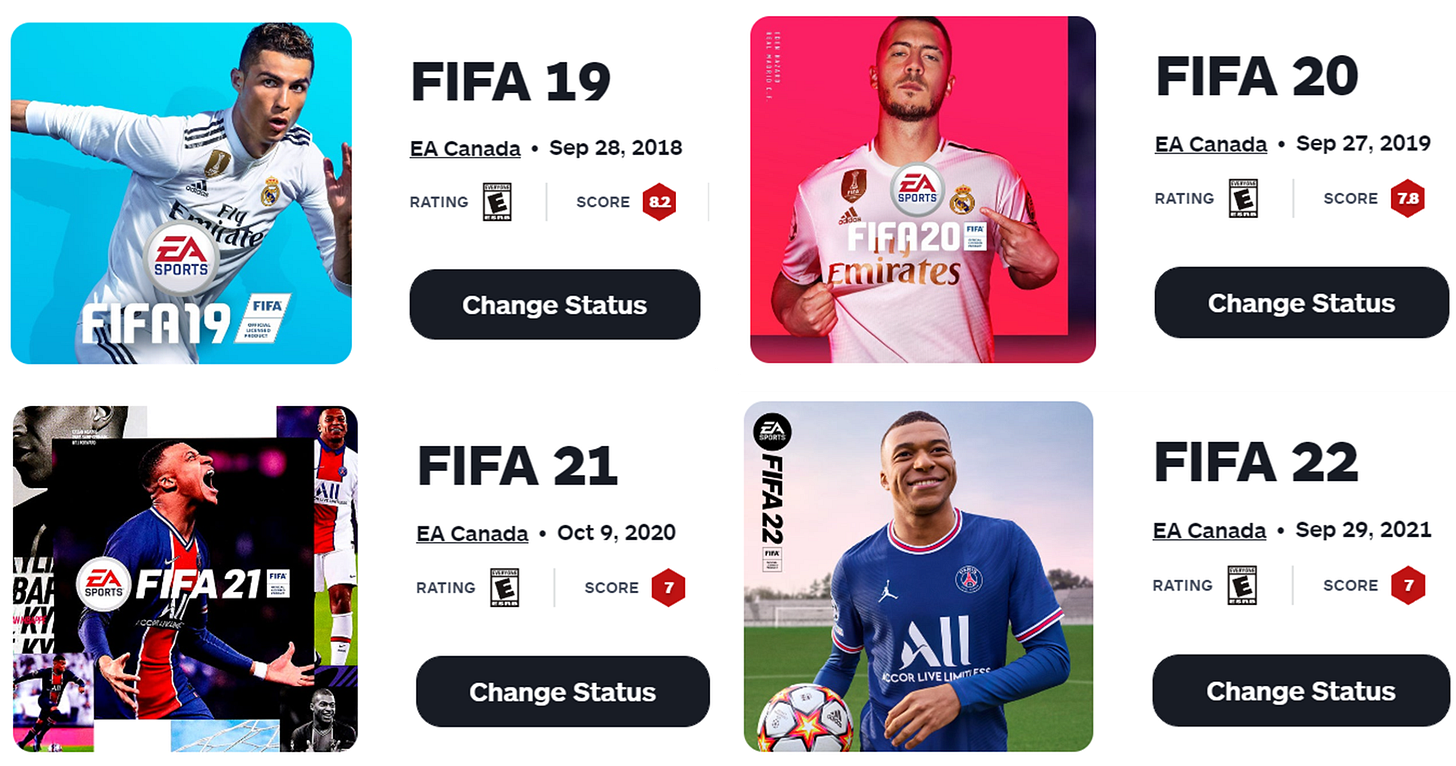Got you! Ted Lasso isn’t joining the Metaverse, him and his happy band of misfits are joining the biggest Football game in the world, FIFA 2023, which launches Friday 9/30:
This will be the last Electronic Arts Football/Soccer game with the FIFA brand, after almost 30 years to the day. I remember playing the first one that ever came out, FIFA International Soccer, in 1993 on Super Nintendo. It was exhilarating at the time, and looking back also one of the most basic games ever. One of the buttons allowed you to literally push other players out of the way, making me wonder if the developers had ever even watched a Football (Soccer, sigh) match ever. Here it is in all it’s 1993 glory:
Back to 2022 and Ted Lasso. The FIFA franchise has dominated the Football/Soccer videogame landscape for a long time, with iterative innovations coming every few years for what has become a tired format for some. Don’t get me wrong, it still sells millions and millions of copies every year, but there’s only so much you can innovate a game based on a sport without making it too complicated. Reviews and consumer interest are still strong but have been declining over the past five years:
Google Trends Data for FIFA 19, 20, 21, 22 and 23.
IGN Ratings for the last 4 FIFA games
In the meantime, Ted Lasso came out at the height of the Pandemic in August 2020 and gained massive cultural status in 2021 when it’s second season came out and it went from niche darling to mainstream hit. Here’s how it compares to the FIFA launches:
Season 3, it’s allegedly final season, will probably come out some time in 2023, and it’s clear that it’s the biggest hit Apple TV+ has on its hands, universally loved by audiences and critics alike. This partnership is smart for both brands, EA Sports gets a boost right before the last FIFA named game hits consoles and PCs and Apple TV+ keeps interest high in its biggest franchise as audiences wait for the third and possibly final season. The best part of this execution is that it fits both brands perfectly. FIFA 23 players will be able to play with Richmond FC in any of the game modes, including playing as Ted Lasso in career mode. Unlike many other brand/game examples, this partnerships adds to the consumer experience in FIFA 23, it’s not a distraction, or worse, an intrusion. This is a key, key principle for brands jumping into gaming, as Activision Blizzard’s Chief Creative Officer, Pelle Sjoenell eloquently put it:
To understand how wrong it would be to try and market in the old ways to gamers, imagine a brand trying to engage with the audience of a sports game by running down on the field, interrupting the game to ask the players if they want to buy their stuff. Don’t do it!
Why I’m Skeptical.
Ted Lasso x FIFA 23 launches alongside another notable brand jumping into gaming (please ignore those shouting Metaverse, it’s gaming), which I’m a lot more skeptical about: Walmart x Roblox, with the launch of two experiences:
There’s been a lot of skeptical takes on this, and at first glance I had the same reaction, here’s another brand clumsily jumping “into the Metaverse” to try and get down with the kids. I’m still of this opinion to some extent, building a new game or gaming experience isn’t the hard part, the really hard part is to get gamers to care. Walmart has a lot of money and will surely spend quite a bit promoting these experiences with paid media, but no amount of advertising can make people try these more than once if the experience isn’t great. That’s the key metric we don’t get to see, do people come back for more? That’s the point of gaming really, getting people to play your game over and over, and I think this will be a big challenge for Walmart Land. That said, Walmart’s Universe of Play could be an interesting experiment. It’s not trying to create a place for people to play with the Walmart brand (why would anyone want that...), it’s a place for kids to interact with their favorite toy brands like Paw Patrol, which Walmart happens to sell plenty of. It's entirely likely that Roblox players will want to play games with these characters over and over again and then ask their parents to take them to Walmart to buy the toys. Seems to me like an experiment worth throwing some money to for a brand that has a lot of it.
The real questions here are less about potential effectiveness and more about the ethics of doing this. Advertising to children is heavily regulated, rightly so, but at the same time we’re seeing more brands create experiences in Roblox, a platform that is used by a lot of kids under the age of 131:
Roblox has been working hard, and somewhat successfully as the chart above shows, to grow their consumer base that’s 13 years or older, which in 2021 became more than half. Frankly that was probably going to happen anyways as their earlier customers went from being 13 and under to, you know, older, but still almost half of them are younger than 13. From what I can tell, neither of the Walmart Roblox experiences are age gated, I assume because the content is theoretically kid friendly. The question then is whether Roblox should allow branded experiences to be accessible to kids under the age of 13 at all. It’s a slippery slope, neither of these experiences are breaking any regulation on advertising to children, but they’re both designed to advertise Walmart and other toy brands to them. Admittedly I’ve never worked on a toy brand, but other brands I’ve worked on are always very careful to avoid advertising directly to children, what makes this different?
Why I’m Optimistic.
With the explosion of Metaverse mania we’ve seen a lot of frankly mediocre brand executions across various games/virtual worlds. The Ted Lasso x FIFA partnership is instead, on paper at least until we see the game, a good one. The reason it’s a good one is that it’s not a brand trying to force their way into a game because “that’s where young consumers are”. It’s instead a good example of understanding that brands can play a meaningful role in other settings that consumers are passionate about if they add value to the experience. We know this works in the real world, why wouldn’t it apply to gaming? The foundational principles that make good Advertising work are the same, always have been, always will be. If we apply them to gaming we can continue making great work that consumers will enjoy. Learnings from Entertainment brands like Ted Lasso are somewhat hard to translate to other categories directly as people do genuinely love them, unlike, say, soap. I am hopeful though that this inspires other brands to think a lot more about why and how they decide to participate in gaming moving forward and find ways to add value to gamers’ experiences.
Brands jumping into gaming just because they’ve finally woken up to the fact that it’s been one of the largest sectors in the world for years isn’t a strategy, it’s clumsily jumping on the bandwagon and annoying everyone that’s been on it for a while already. For anyone thinking about doing this, I urge you to first read my post: Why though?









